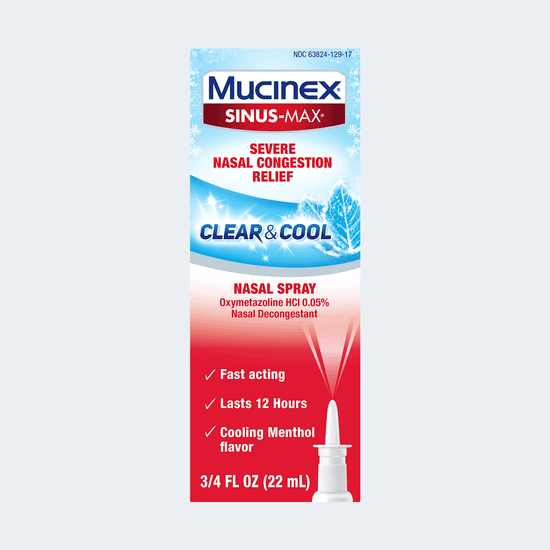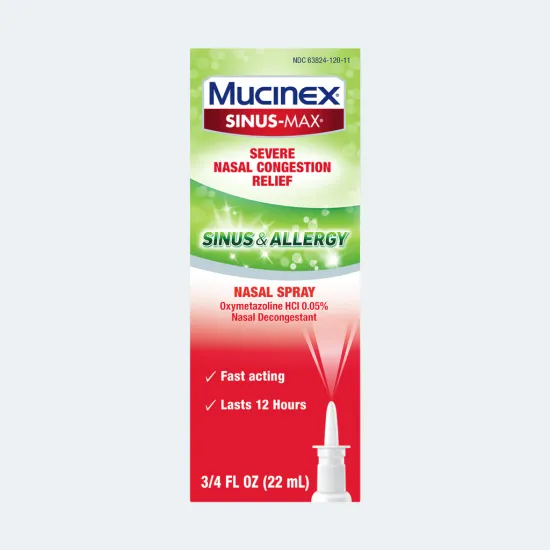
Sinus Infection Getting Worse? 4 Things That Might Worsen It
Shop the article


30 NOV 2023
Can a Sinus Infection Get Worse? 4 Ways to Help Prevent Your Sinus Infection From Getting Worse
If you’re like most adults, your sinus infection arrived on the heels of a common cold or some other upper respiratory viral infection. Although such infections tend to last only about a week [i], the stuffy nose, sinus pressure, headache, sore throat, and general lack of energy can interfere with your life in the meantime.
You’ll want to manage your symptoms — and steer clear of anything that might make them worse — as the infection runs its course. Here are four things you might be doing to contribute to your sinus infection getting worse, and tips on how you can avoid them to feel better faster.
What Makes a Sinus Infection Worse?
1. Not Getting Sleep Can Make Your Sinus Infection Worse
It turns out your mother was right: Your body needs rest when it’s fighting off a sickness. Taking it easy during the day and getting enough sleep at night are key to giving your immune system the energy it needs to do its job.
Going to work, meeting all your deadlines, and keeping the same pace you did before you were sick can leave you feeling totally depleted. Worse, the stress of keeping up when you don’t feel well may exacerbate your headache or sinus pressure[ii]. Allow yourself to slow down, especially in the first few days when symptoms are at their worst.
2. Dehydration May Make Your Sinus Infection Worse
It may surprise you to know that when your body is producing more mucus, as it does when it’s in the throes of a viral infection, you need to drink more water to stay hydrated.
Not drinking enough water when you have a sinus infection can make headaches and sinus pressure worse; it can also lead to thicker mucus that’s harder to expel. On the other hand, drinking enough fluids can help thin your mucus[iii], which makes it easier to get rid of. The type of drink you choose could make a difference in your symptoms, too. Ice-cold drinks can soothe a sore throat, while hot drinks, like hot tea or water with lemon, can help loosen mucus.
3. Dry Months or Climates Can Cause Sinus Infections to Get Worse
If you’re dealing with a sinus infection during the dry winter months, or if you live in an otherwise dry climate, the very air you breathe can irritate your nasal passage and exacerbate your symptoms.
Give your nose a break by running a humidifier or a cool-mist vaporizer in your bedroom at night. You may find it helpful to run it during the day, as well. Humidified air can promote drainage, soothe sore throats, and help ease coughs. If you don’t have a humidifier, you can help promote drainage by running a hot shower in a closed bathroom and inhaling the steam two to four times a day
4. Smoke and Strong Scents Can Trigger Sinus Symptoms
Dry air isn’t the only thing that can irritate your nose and make your sinus symptoms worse. Inhaling cigarette smoke, strong perfumes, pollutants or any airborne allergen that affects you can lead to further inflammation and greater sinus pressure.
If you’re a smoker, don’t smoke when you have a sinus infection[iiii]. If you like to wear perfume, take a break until you’re better. If the air quality where you live is subpar, you may want to stay inside as much as possible, particularly in the first few days when your sinus infection symptoms are at their worst.
Is Mucinex® Good for Sinus Infections?
Nasal decongestant sprays can offer great symptom relief when you’re battling a viral sinus infection. Their concentrated mist can promote nasal and/or sinus drainage mucus and help it flow, temporarily restoring freer breathing through the nose while you have sinus infection symptoms.
Mucinex® has three options for nasal decongestant sprays that may soothe your sinus infection symptoms. Mucinex® Sinus-Max® Severe Nasal Congestion Relief Clear & Cool is a fast-acting, non-drowsy spray that can help you cope with the sinus pressure you’re feeling for up to twelve hours.
While meant to help you find nasal congestion relief from hay fever or other upper respiratory allergies, Mucinex® Sinus-Max® Severe Nasal Congestion Relief Sinus & Allergy can still be an option for sinus pressure relief from a viral sinus infection. This spray can help you find twelve hours of sinus relief, day or night.
Remember that it is extremely important that you don’t use decongestants for longer or more often than what’s recommended — overusing decongestant nasal sprays can actually lead to rebound congestion and make your symptoms worse. Talk to your doctor if you feel your sinus infection worsening or before trying a nasal decongestant, and use it only as directed.
Understanding how to prevent your sinus infection from worsening is essential for helping you feel better sooner so you can get back to your normal routine. By prioritizing rest, staying hydrated, and creating a humid environment, you can help alleviate discomfort and support your body's healing process.
Avoiding irritants like smoke and strong scents, using Mucinex® nasal decongestant sprays as directed, and seeking professional medical guidance are important steps toward managing sinus infection symptoms effectively. Remember, taking care of your immune system during this time is critical, and making these adjustments may make a significant difference in your sinus infection healing journey.
